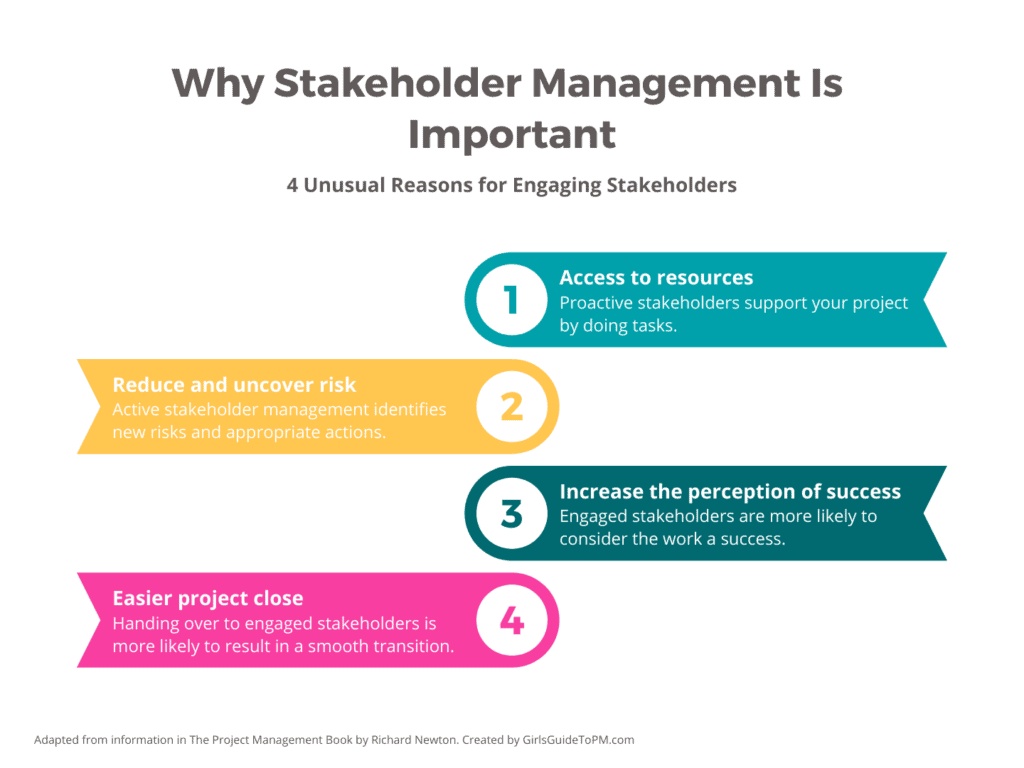Why do stakeholders contribute?
This blog is reader-supported. When you purchase something through an affiliate link on this site, I may earn some coffee money. Thanks! Learn more.
Why do stakeholders take part in projects? You might think that’s an obvious question.
After all, your project sponsor is probably the one who wanted this project to happen in the first place, and he or she has a vested interest in making it a success. But aside from the sponsor, all those other stakeholders don’t have to play nicely. They make an active choice to either help out, or hinder your project.
It’s a question asked in Project Stakeholder Management by Pernille Eskerod and Anna Lund Jepsen (part of Gower’s Fundamentals of Project Management series). It talks about why stakeholders make the choice to contribute to projects.
Eskerod and Jepsen say that before stakeholders make a commitment to a project they weigh up:
- The expected consequences, both in terms of benefits and costs
- What others will think about their involvement
- Obstacles for making a contribution.
Stakeholders might not work through this list and make conscious decisions, of course. It can be a very illogical process that they may not even be aware of. But as a result of those thought processes, however chaotic and unconscious, they will decide whether or not to contribute and if they will contribute, how much they will contribute.
Assessing the consequences
Project stakeholders obviously cannot know exactly how the project will work out, because it hasn’t happened yet.
They also don’t have all the information to be able to make an informed decision about the expected consequences of their involvement in the project, as they probably have less information about the project than you do. Instead, they will consider their perception of the consequences, and use that as a decision-making tool.
The consequences of their involvement could be positive or negative. There are both benefits to being involved, and costs. The benefits are things like:
- Being involved with a high-status, high profile project
- Increased exposure to senior leaders
- Tangible outcomes for their department such as the project deliverables like new software
- Being able to shape the direction of the project as an early adopter instead of just accepting the changes later when the pilot is complete – getting in on the ground
- Getting more skills for themselves or their team members
- Career progression for themselves or their team members.
Costs are the other side of the equation, things that they will have to ‘pay’ in order to take part in the project like:
- Offering up resources in the form of people or services
- Money from their budget to fund the project
- The time commitment
- The administrative overhead of taking part in a project
- The potential for negative publicity or a negative impact on their career if the project goes badly.
A stakeholder will mentally run through all of these and end up with a judgement about what is in it for them. There are probably a host of other things that you can think of that may affect a stakeholder’s willingness to contribute to a project.
If you can work out what is bothering any particular stakeholder, you can work with them to overcome these issues and get a more positive outcome from them.
Concerns about contributing
Some people may be very keen to contribute but find that something is holding them back, consciously or unconsciously. One of these things could be what other people will think.
Peer pressure is prevalent in office environments, and what other people think about their involvement in the project is bound to form part of the decision making process for stakeholders.
You can help them make the ‘right’ decision by encouraging them to see their contribution in a positive light, as something that someone in their position would naturally or logically do – assuming, of course, that you do want them to contribute! Otherwise I suppose you could encourage them the other way.
Stakeholders also consider influences from their own environment, outside of the project, so you could lobby those around them so that they hear positive messages from their own communities. This could include talking to their boss or mentor, or providing other options for positive role models to show that their community would value their involvement with this project.

Can they contribute?
Another reason why people may be reluctant to spend time working with you on the project is that perhaps they don’t feel capable of contributing in the way that you require. They may not have the skills they need, or they may feel as if they don’t.
You can help by encouraging them and boosting their confidence. You can also help in practical ways, such as providing training. One of the reasons people don’t want to get involved with projects is that they perceive a significant overhead in administration or in project
If you are expecting them to use software you can point out how easy they are to use and even provide some training. Once people have a good grasp of what is required of them, they will be less reluctant to commit to the project.
Finally, they may need permission to contribute, so even if they are very keen, they may still be waiting for their line manager to give them the go ahead.
If you suspect that this is what is holding them back, have a quiet word with them and then approach their manager and ask him or her to release your stakeholder for some work on the project. Your stakeholder may have had a gut feeling that permission would be refused, but if you don’t ask, you’ll never find out!

